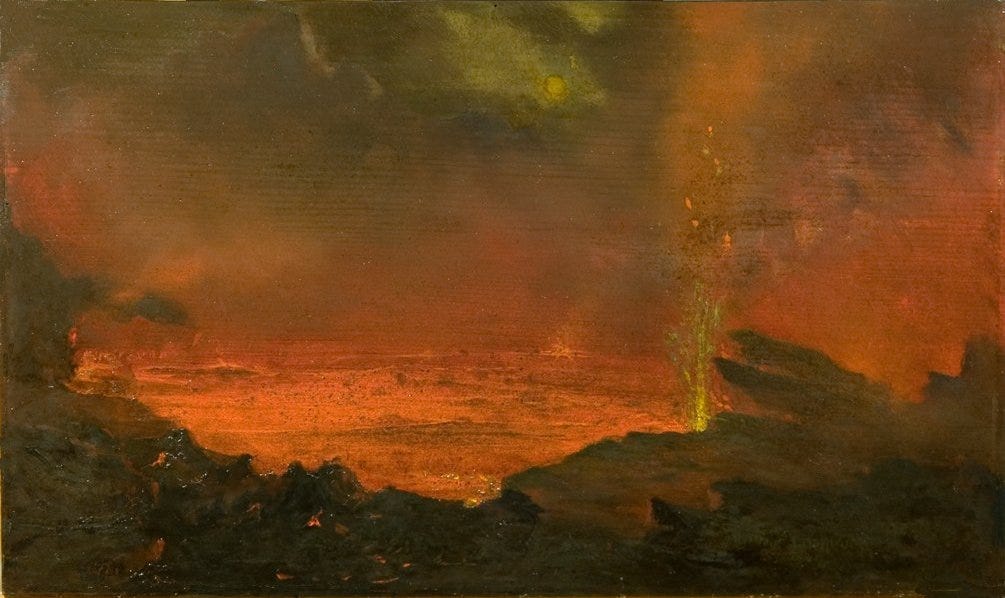Reading, Watching 05.05.24
A Nationalist, but not a Patriot
This is a regular feature for paid subscribers wherein I write a little about what I’ve recently been reading and/or watching. Hope you enjoy!
First, I’m obligated to remind you that When The Clock Broke: Con Men, Conspiracists, and How America Cracked Up in the Early 1990s is available for pre-order.
Here’s a sample of some of the early press the book has received:
"Lively and kaleidoscopic." —Andrew Marantz, The New Yorker
"[A] fascinating shadow story of the 1990s." —Ezra Klein, The Ezra Klein Show
"Lucid and propulsive . . . [When the Clock Broke is] woven throughout with astute analysis of the period’s political commentary . . . Ganz's dry wit is ever-present . . . This is a revelation." —Publishers Weekly (starred review)
"A searching history of a time, not so long ago, when the social contract went out the window and Hobbesian war beset America . . . Ganz makes a convincing, well-documented case that everything old is indeed new again. A significant, provocative work." —Kirkus Reviews (starred review)
Usually I put letters from readers in a mailbag post, but I thought this message was a very interesting response to my piece last week about Mizrahim, so I’m gonna share it here (anonymously):
Hi, just wanted to thank you for the sephardi/mizrahi article. It's rare to see something in English that gets this right. I'm a Yemenite Israeli American (my dad and his whole family and my mom's whole family all came to Israel in the 40s and 50s, we have been in the US since the 80s). I've observed in my own life and family the trends you describe in this piece, including the poverty and discrimination, the IDF's use of soldiers in especially dangerous units (or if not that, as manual laborers, but never in leadership roles that secure upward mobility in the larger Israeli society), the rightward tilt, and the identity politics borne from both a long historical memory of oppression in Arab countries and also a way to identify with the state that rescued them, but one that, in turn, has had to wage war against and also oppresses people who are just like them. This war and the discourse around it, has been so incredibly painful for me, a devoted peacenik since the 90s, who for the past 30 years has been watching my country change into something that it maybe has always been. But I'll say that what I've been seeing, nonstop, are images of soldiers, hostages, Palestinian civilians who look like and have the same names as my cousins, my siblings, my kids, all of them suffering. And what I've been hearing is honestly mostly stupid and offensive bullshit. My family sees me as a naive American, who doesn't understand how hard it is to live in a country that's "in a bad neighborhood." I get that, things look different when the threats come from places that are so close, where here we get the luxury of being an ocean away from basically, everything. But as an outsider both here and there, I feel like I see so clearly how similar we are -- we eat the same food, the aunties scold us the same way, we all got "randomly selected" for extra screening after 9/11 -- but still can't see through to each other's humanity. Anyway, that's a long way of saying thanks for writing this.
Oh! I also wanted to say I didn't know about Peres's Khomeni comment! That is such a rich text. One of the first racist things I remember was two weeks into 7th grade at public school (I had gone to Jewish school before) was some kid saying to me "Khomeni loves you!" which was so stupid and comical I could barely process it. I remember (imagine?) telling him "that's so dumb, if he had one bullet he would shoot me instead of you.
Thank you! It’s really gratifying that it resonated so much with your experience.
Since I’ve been thinking quite a bit about nationalism lately, I remembered this passage from the great conservative historian John Lukacs. It was originally part of a 1992 essay in The American Scholar. I don’t quite agree with every word, but I think it’s valuable nonetheless:
That nationalism differs - and often profoundly - from patriotism is something to which we should have paid more attention, especially in the United States where the two terms are still regrettably confused. When Americans speak of a super-patriot they really mean an extreme nationalist. When Dr. Johnson pronounced his celebrated phrase, "Patriotism is the last refuge of scoundrels," he meant nationalism, since the latter word in English did not yet exist. When Hitler, writing about his youth in Mein Kampf, said that "I was a nationalist; but I was not a patriot," he knew exactly what he meant, and so ought we. Patriotism (as George Orwell noted in one of the few extant essays about its distinction from nationalism) is defensive, while nationalism is aggressive; patriotism is rooted to the land, to a particular country, while nationalism appeals to the myth of a people, indeed to a majority; patriotism is traditionalist, nationalism is populist. Patriotism is not a substitute for a religious faith, whereas nationalism often is; it may fill the emotional and at least superficially spiritual - needs of people. It may be combine with hatred. (As Chesterton wisely said, it is not love, which is personal and particular, but hatred that unites otherwise disparate men. "The jingo nationalist," said Duff Cooper, "is always the first to denounce his fellow countrymen as traitors.)


